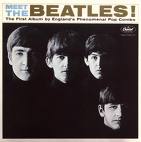
I think the first album I ever bought as a kid was “Meet the Beatles.” It was a hit record and was featured at the checkout stand at the large market where my family did our shopping. Over the years I collected all of their records.

The record player in our house was an all-in-one job, it was before stereo components were common. My favorite feature was that you could stack record albums and as one would finish, the next would automatically drop down and start to play. I particularly liked stacking ‘Rubber Soul,’ ‘Revolver‘ and ‘Sgt. Pepper.’ The spindle’s stacking limit was five records.
Much later I had a fondness for the mix tape. My music library had expanded by that time. The 90 minute tape allowed 45 minutes of music per side. Putting together a good mix tape was a badge of honor. Getting the perfect songs and sequence, and then making everything fit perfectly required a lot of effort — adding up song durations, pulling songs from multiple albums, starting and stopping the tape to create the perfect flow.
If we skip ahead to the present day, we have the playlist — a drag and drop affair. My iPod has a couple of playlists with well over 100 songs. Generally I use them for background music for dinner parties.
The digital removes all boundaries, the records can now be stacked all the way to the sky. We can collect so much more digital media than we can consume. In an era of human proportions, we could say a person’s eyes were bigger than their stomach. Now our our eyes can scan through thousands of pointers to digital files containing all kinds of media. Since we can’t actually experience it, we consume it through an abstraction layer only through our eyes.
Hugh McCloud once said, “Human attention doesn’t scale.” How do we bring human proportions to the limitlessness of the digital? What is the moral and mortal force that moderates the infinite?
Michael, that's the perfect joke for this post. Language is a kind of abstraction, we create abstractions to point to the abstractions. What is that causes some sense of the original thing to shine through? It's all in how you tell it.
An old joke anticipates the riches of being able to point to anything and everything. A guy is friends with a comedian. And the comedian drags him along to a dinner for comics and comedy writers. As he's eating, someone stands up and shouts out a number, “387.” The room dissolves in laughter. Someone else gets up and shouts, “28.” More laughter. This goes on a while, and the guy is mystified. He asks the comedian who brought him what was happening. “Oh, well, we all know all the jokes. We don't have to tell them anymore. We just get up and call out the number and everyone gets it.”
The guy is impressed. He thinks he'll try it. He stands up and shouts, “1287.” Nothin. Silence. An oil painting. He leans down to his friend and asks, “What happened? Why didn't they laugh?” The friend replies. “You didn't tell it right.”
For me the best filter has been word of mouth recommendations by like-minded friends. Sometimes I just go off on my own discovery process and then bring back the results to others. In this regard I tend to be more organic in the discovery process, like you. I don't want the algorithms to tell me what I'll like. That needs to come from friends, acquaintances, even like-minded strangers who find amazing creations and bring them back to share.
Flickr is an example of an algorithmic discovery process that only works to a small extent. The real joy of Flickr is participating in the community and discovering creations on one's own that are then shared via blogs or faves or whatever with others.
It's a time-consuming process, but worth the effort.
The question about filters is which let through the best stuff? The machine filters, the algorithms of The Google, or the human filters, the small world networks of micro-communities. I don't want to be on my own with a bunch of mechanical filters. I want to know what you think is good — because then we can talk about it (and make a new thing through dialog.)
It's all about the filters. Before digital media we relied on friends and DJs to push music recommendations. Now we find it ourselves. Even then, I'm sure I miss more than I find, but at the same time, it gives me a great deal of joy to know that what I want to find can be found here in the digital world.
Attention may not scale, but as the filters get more sophisticated, it's easier to sort out what resonates from what doesn't, allowing the deep dive to the best while ignoring the rest.